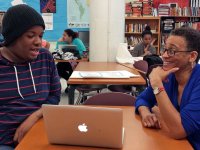Conversing, Consulting, and Creating
Through quick, deep, frequent conversations, teachers can understand students’ ideas and support their challenges, act as a guide, and help identify models and sources of inspiration.
Your content has been saved!
Go to My Saved Content.I pull up a chair and join a group of students at their table. They're leaving feedback on each other's drafts, writing notes about writing that works well along with ideas for improvement. "What type of feedback would be most helpful?" I ask, knowing that if I want to check in with every student, I have only a couple of minutes for each conversation.
Sitting next to Jasmin, I lean over to see her screen and quickly scan what she's written while trying to figure out what I can offer to help her move her work forward. "These are really powerful ideas that you're beginning to investigate," I tell her. "I wonder if you can do more to draw readers in right from the beginning? You could open with a short descriptive scene as evidence of why this issue matters."
When I'm sitting next to Reggie, the conversation has a different focus. "I'm trying to understand what you're writing about. The first part of your paper focuses on the idea of literacy, but then it shifts to the experience with your family. How are these connected?"
With Kenny, our short conversation becomes a strategy session for him as an English-language learner. "I've noticed that you struggle with verb tenses. What do you need to do to submit a paper that doesn't have verb tense mistakes? How can I, and others, help?"
Moving Beyond Formative Assessment
As a younger teacher, I remember regular feelings of disappointment as I graded student work. Much of what students produced felt on the verge but hadn't yet come to fruition. One student found excellent sources but never fully developed a focus. Another began to develop powerful insights but would have benefitted from questions leading him to further clarify and develop his thinking. Sadly, my grading and realizations about what would help students usually occurred at an endpoint when they had no more attention or patience for work they had "completed." The written comments that I offered them were skimmed, if read at all.
Those of us who spend our days with young people know that teaching is an enormous interpersonal challenge and that student motivation and progress are often tenuous. Students have few reasons to invest themselves in their work and no reason to view learning as a collaborative act if they don't feel valued as individuals, as thinkers, and as creators. The small conversations that occur when teachers shift the focus to consulting with students are beneficial in the following ways:
- They help build relationships.
- They allow teachers to get a real sense of student progress and understanding.
- They help teachers nurture emerging student ideas.
For good reason, there is a growing emphasis on formative assessment. While there's a place for small activities that allow teachers to gauge understanding, it's more crucial to make conversations with students a core element of classroom practice. By leaving the front of the room, checking in, conversing, and consulting with students, teachers shift the paradigm of what it means to learn. Several practices work to support the idea of teacher as consultant and help establish collaborative, participatory, intellectual communities:
Sharing Ideas in Process
By having students share their rough ideas and work-in-process with peers, everyone is exposed to the messiness of creation, and the process becomes a communal undertaking rather than an individual struggle. This process can be modeled by teachers and provides opportunities for collective feedback.
Seek to Understand and Support
Too often I find myself assuming that I get what a student is attempting to accomplish, only to realize that I misunderstood. By reminding myself to approach each student with the intent of listening and understanding, I strive to figure out their thinking before sharing my own ideas.
Decentralizing Authority and Knowledge
Consulting with all of my students is an enormous task and one that I could never do on my own. Fortunately, peer feedback is very powerful and assists students in taking ownership over the requirements of an assignment. When students peer review each other's work, I am able to move around the room and add to work that is already happening.
Finding Inspiration and Models
Consulting is most effective when it connects students with outside sources or model texts that help move their ideas forward and give them a clearer sense of what they can create. Remembering this reminds me to ditch the expert hat and instead act as a facilitator, exposing students to information that they might not otherwise find.
A Challenging Path
It's liberating to abandon the idea that I'll assign work, students will complete it, I'll grade it, and we'll move on to the next thing. Now I think of my role as showing students to the beginning of a path that they must explore for themselves. They're the ones who figure out their direction and the shape of their final destination. I'm there, waiting in many different places along the way, offering support, critique, and guidance. The learning is designed as a way of challenging students to examine new ideas, and ideally it results in students producing work that goes beyond their expectations of their own abilities.
It's important for me to remember that this type of work is challenging for people of any age. Whether they're learning from the stories of immigrants, investigating democracy, creating a video about their Education Vision, or developing ideas about literacy, my students need clear expectations, they need models, and they need feedback. Viewing school as a collaborative, creative process allows us to connect, to grow, and to truly learn from each other.
